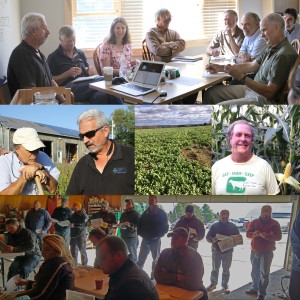
(TOP) First annual ME soil health test event, with (L to R) Ray Archuleta (NRCS-NC), Rick Kersbergen & Caraugh Fitzgerald (UMe Extension), Bob Burger (Solvita), Larry Sikora (ARS Soil Microbiology), Will Brinton (Wood End Lab), Bruce Hoskins (UME Soil Lab) Lucas Rumler (Solvita). Mid-Left: Brinton and Archuleta in cover crop research plots; (mid-center) Tillage-radish in Aroostook; (center-right) Jeff Stevens in No-Till/Cover-cropped corn; (bottom) Aroostook farmers at a late fall SWCD-sponsored Soil Health Meeting
Maine has by most accounts not figured prominently in modern soil health initiatives, but 2015 stands out as a harbinger of great things to come. An emerging group of progressive farmers are demonstrating reduced-tillage + cover-copping methods work in corn, alfalfa and potato rotations, and two leading soil labs are collaborating to innovate soil analysis. In the northern-most county against the Quebec border, the Central Aroostook SWCD held a very well-attended soil health session with contributors from NRCS, Woods End Labs, Porter Farms, and McCain Foods whose push for a farm-wide 45cwt potato yield jump has led its agronomists to recognize one thing: success will come in the form of soil health. Porter Farms showed excellent fields of late summer radish after small-grains. In central Maine, a UME extension meeting featured Steven’s Wingate Farm healthy no-till corn in cover-crops with earthworm castings present everywhere.
A distinguishing event of the year was the First Annual Soil Health Analysis group sponsored by Woods End Labs. Visiting presenter Ray Archuleta (NRCS) met with scientists from University of Maine-Orono, Woods End Lab, ARS, Solvita, UME Extension, in a frank and congenial discussion of next steps for analytical capabilities in soil health measurements. Woods End presented a new Volumetric Aggregate Stability test, soon to be released.
Maine’s cool-temperate climate with fairly weathered soils can be challenging, yet Maine was once the “bread-basket of New England.” Maine statistics show a significant growing population of young farmers and Maine has one of America’s most cohesive organic grower associations, all this adding up to one thought: if Maine makes soil health practices work under these conditions, there’s no stopping it anywhere.

